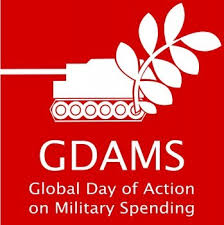 The Global Day of Action on Military Spending (GDAMS) takes place every year in mid-April. This day of action was originally proposed by the International Peace Bureau (IPB) and the Institute for Policy Studies (IPS) with the primary goal of promoting a general awareness of the vast amounts of public money spent on the military.
The Global Day of Action on Military Spending (GDAMS) takes place every year in mid-April. This day of action was originally proposed by the International Peace Bureau (IPB) and the Institute for Policy Studies (IPS) with the primary goal of promoting a general awareness of the vast amounts of public money spent on the military.
Groups around the world who support GDAMS are calling for a major shift in budget priorities so that human development programs can be adequately funded.
Global military spending
In 2011, the Stockholm International Peace Research Institute (SIPRI) estimated global military spending to be US $1,738 billion. The ramifications of this funding bias are significant. As IPB points out, research does not show that building a bigger army is the best way of keeping a nation safe from violent conflict and warfare. Rather, funds spent on weapons divert resources from social, political, and economic development that can address the root causes of conflict.
Currently global defence sector expenditure equals $4.7 billion a day or $249 per person. Only a small proportion of this expenditure, between 5% and 10%, would be required each year to fund the United Nation’s 17 Sustainable Development Goals (SDGs) that are designed to make the world a more equitable and safer place.
GDAMS 2018
This year GDAMS runs from April 14 to May 3, 2018. Already campaigners around the world have been raising public awareness about excessive military spending under the banner : “Reducing 10% of military assets will help save our planet. Take action!”
While the level of global military expenditure has reached a record $1738 billion per annum, many nations have failed to lift their foreign development aid budget to the UN’s recommended target of 0.7% of GDP. To counter these shortfalls, the IPB advocates reductions in excessive military spending and the shifting of these resources to projects dedicated to addressing human needs, both domestic and international.
Cuts to Australia’s foreign aid program
Regrettably Australia is one of the nations that have failed to fulfil the UN’s foreign aid target. The Coalition government’s 2016/17 federal budget slashed $224 million or 7.4% of the aid program. This represents the sixth-largest cut in any one year to the nation’s overseas aid program. The Lowy Institute reports that “these cuts have seen Australia tumble in international rankings and left Australia at an all-time low when it comes to its aid generosity as measured by aid as a proportion of Gross National Income.” Refer to the graph below.

Australia’s new “defence export strategy”
Coinciding with this lamentable trend is Prime Minister Turnbull’s new “defence export strategy” designed to make Australia one of the world’s top 10 weapons exporters within the next decade.
According to government figures, Australia currently sells about $1.5 billion to $2.5 billion in “defence exports” each year. In order to significantly boost these military exports, the strategy will target a number of “priority markets” including the Middle East, Europe, the United States, the United Kingdom, Canada, New Zealand and the Indo-Pacific region.
To facilitate this strategy, the government plans to establish a new Defence Export Office which will partner with Austrade and the Centre for Defence Industry Capability to boost arms exports.
In addition, a $3.8 billion Defence Export Facility, to be managed by the Export Finance and Insurance Corporation (EFIC), will provide financial assistance to local armament companies to help them sell their military equipment internationally.
In conjunction with the Australian Defence Export Office, the government also plans to create a new Defence Export Advocate to provide high-level advocacy for defence exports and co-ordinate collaboration between industry and government.
The strategy as a whole is designed to complement the government’s commitment to invest a record $200 billion in Australian Defence Force (ADF) capability over the next decade.
A recipe for more violent conflict and insecurity
In drastically cutting Australia’s foreign aid budget as well as committing to making Australia one of the world’s top 10 weapons exporters within the next decade, the Coalition has shattered any pretence about being a government devoted to peace. These measures, along with the Coalition’s foreign policy and hostility to combatting climate change, mean that Australia has increasingly become a negative force in world affairs.
Members of the group joined the ‘Street Theatre Extravaganza’ in Railway Square, Sydney on Saturday April 21, 2018. View a YouTube video of the main event, in which Christopher Pyne MP is warded the ‘MIMOD’ medal (2018) for the Most Improved Merchant of Death.